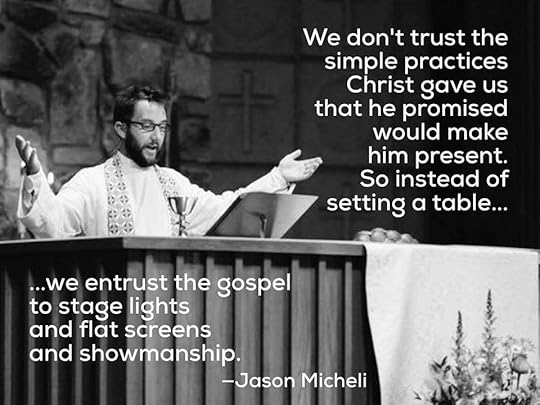Jason Micheli's Blog, page 152
November 25, 2016
Episode 55: Trumping the Demon of Racism
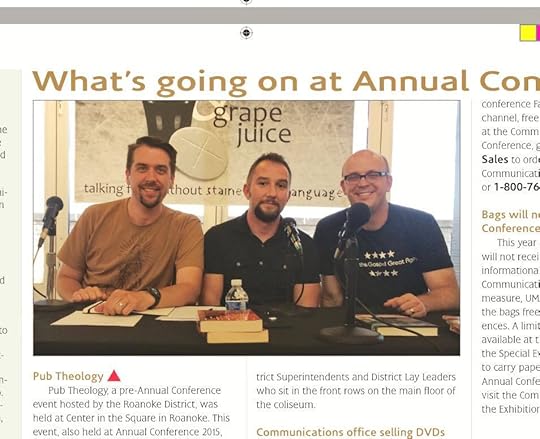 In the wake of the 2016 election, Morgan Guyton from the Crackers & Grape Juice posse and author of
How God Saves the World from Us
talks with Suhuey and Jen, United Methodist Hispanic Youth, about how racism recently intruded upon a gathering of youth in North Carolina.
In the wake of the 2016 election, Morgan Guyton from the Crackers & Grape Juice posse and author of
How God Saves the World from Us
talks with Suhuey and Jen, United Methodist Hispanic Youth, about how racism recently intruded upon a gathering of youth in North Carolina.Be on the lookout for future episodes with next week with Brian McLaren and Father James Martin and, this week, a special book debut episode to launch my book Cancer is Funny: Keeping Faith in Stage Serious Chemo. For that episode, Teer Hardy spoke with an all star lineup including Tony Jones, Todd Littleton, Jeffrey Pugh, Kendall Soulen, and JC Herz.
The Cracker & Grape Juice team will be part of Home-brewed Christianity’s Theology Beer Camp this January in L.A.. There’s only 15 tix left so if you’d like to be a part of it, check it out here.
You can download the episode and subscribe to future ones in the iTunes store here
We’re breaking the 1K individual downloaders per episode mark.
Help us reach more people:
Give us 4 Stars and a good review there in the iTunes store.
It’s not hard and it makes all the difference.
It’ll make it more likely more strangers and pilgrims will happen upon our meager podcast. ‘Like’ our Facebook Page too. You can find it here.
Oh, wait, you can find everything and ‘like’ everything via our new website: www.crackersandgrapejuice.com
If you’re getting this by email, here’s the permanent link to the episode.
Follow @cmsvoteup

November 22, 2016
Episode 54: Becca Stevens – Consider the Thistle
 “It’s a noble thing for a community (of faith) to have a decent beggar (a pastor).”
“It’s a noble thing for a community (of faith) to have a decent beggar (a pastor).”
In one of our best conversations yet, in Episode 54 Jason and Taylor talk with Becca Stevens.
Becca is an Episcopal priest at Vanderbilt Chapel in Nashville, Tennessee, author of Snake Oil and many other books, and, most importantly, she is the founder of Thistle Farms, the largest social enterprise in the U.S. run by survivors of sex trafficking.
She’s also up for CNN’s Hero award. Voting is open until 12/6 and you can vote as many as 10x/day – please support this impressive endeavor.
You can vote for her here.
Do it. And buy your Christmas presents from Thistle Farms too!
I don’t throw around the term ‘blessed’ very often but that’s how I felt for having gotten the change to talk with Becca.
Be on the lookout for future episodes with next week with Brian McLaren, and Father James Martin.
The Cracker & Grape Juice team will be part of Home-brewed Christianity’s Theology Beer Camp this January in L.A.. There’s only 15 tix left so if you’d like to be a part of it, check it out here.
You can download the episode and subscribe to future ones in the iTunes store here
We’re breaking the 1K individual downloaders per episode mark.
Help us reach more people:
Give us 4 Stars and a good review there in the iTunes store.
It’s not hard and it makes all the difference.
It’ll make it more likely more strangers and pilgrims will happen upon our meager podcast. ‘Like’ our Facebook Page too. You can find it here.
Oh, wait, you can find everything and ‘like’ everything via our new website: www.crackersandgrapejuice.com
If you’re getting this by email, here’s the permanent link to the episode.
Follow @cmsvoteup

November 21, 2016
“Awaiting the Messiah with Jason Micheli”
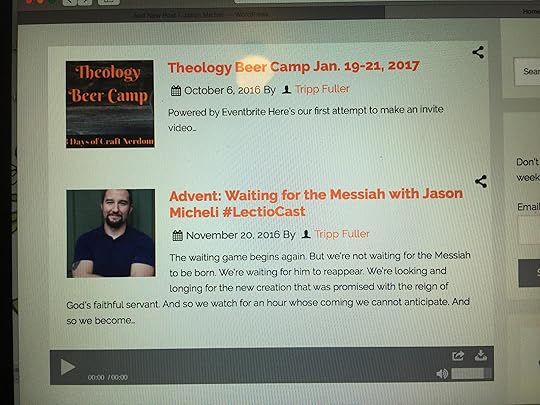
No, the title isn’t an appeal to my ego. The Home-Brewed Christianity #LectioCast was kind enough to invite me as a guest for the next two weeks to talk about my new book, Cancer is Funny, and discuss the Advent lectionary readings.
Hosted by Dr. JR Daniel Kirk, #LectioCast aims to get preachers’ jumpstarted on their prepcrastination by honing in on issues and themes in the scripture passages assigned for the upcoming Sunday and to do so in a way that is sharp, practical, and seasoned with a bit of snark.
Daniel credits me with a “fascinating” interpretation of the Matthew 24 lection. “Fascinating” is most likely NT scholar speak for “incorrect” but I think it’ll preach all the same.
You can listen to the podcast here.
Follow @cmsvoteup

November 19, 2016
Just Like Facials: Your Faith Needs Maintaining
 Here’s a review of my new book Cancer is Funny: Keeping Faith in Stage-Serious Chemo that my friend Libby Todd wrote for the Alexandria Stylebook.
Here’s a review of my new book Cancer is Funny: Keeping Faith in Stage-Serious Chemo that my friend Libby Todd wrote for the Alexandria Stylebook.
The first time I learned about cancer was when I was in middle school. A childhood friend’s dad was diagnosed with a brain tumor. He passed away when we were freshmen in high school. I remember not understanding how someone like him could get sick. He was a handsome, healthy man in his early 40s – a heart surgeon and former quarterback for Ohio State. A few years later cancer hit closer to home when my mom was diagnosed with breast cancer. At 16, I became personally familiar with words like biopsy, malignant, lymph noids, mastectomy and chemotherapy. I got to see first hand how the disease took a toll on my extremely healthy 43-year-old mother. It was the first time I saw my father cry and the first time I was ever truly scared. I remember looking at my then 5-year-old sister and thinking “what if?” The good news is there was no what if – my mom beat cancer and is alive and well and probably on on the back nine of the golf course in Vero Beach as you read this.
As I got older, it seemed I just couldn’t escape the disease and I am sure everyone reading this post feels the same way. We all have relatives, friends, or spouses who battled cancer or maybe you even faced this horrible disease yourself. And no doubt we have all known cancer’s toll. For me, first it was grandparents lost and a few years back Brad’s mom ended her bout with breast cancer. As I get older now, however, the people diagnosed seem to be getting younger.
In 2011 one of my college roommates and closest friends husband with Stage 3 testicular cancer at age 38. Now it’s not just our grandparents and parents who get sick, it is us. In 2013 the unimaginable happened in my most intimate group. One of my best friends in Alexandria’s 3-year-old sons was diagnosed with T-cell acute lymphoblastic leukemia. What that little boy had to endure in the way of spinal taps and chemotherapy and pure fear is truly horrifying.
The good news is in two weeks, that little boy will take what we hope is his last chemo ever and in January I am headed to Key West with my college roommates and our spouses to celebrate Todd’s final scan and his victory over testicular cancer.
Through all of this you can’t help but ask “why,” – especially to God. When my mom was diagnosed, I spent a lot of time being mad at God. I was 16 so I spent a lot of time being mad at everyone to be honest.
Some of you reading you might know this, but I am a Christian – no doubt a few of my friends are rolling their eyes as they read that statement. I know many people who are Christians but don’t have a local church they call home. I, however, am lucky to have a church I love and I go as often as I can. My participation in a congregation is not because I think I am a “good Christian” — more like the opposite. I am usually a pretty bad Christian and I figure with all the other personal up-keep I do – you know the manicures, the facials, the highlights, the exercise classes and we can’t forget the fake eyelashes- how can I not think that my faith doesn’t need maintaining as well?
A few years back we joined Aldersgate Methodist Church primarily because of the Associate Pastor, Jason Micheli. He was one of the few people I had ever met that I considered to be as smart and funny as my husband. During many conversations with both of them I often times have had to look to my best friend, Mr. Google, to understand what they were talking about. Jason’t humor is also a bit off color and juvenile at times, which I completely appreciate. His sermons are serious and comedic and his edge keeps the pews packed and the bishop on notice. His ministry is having an impact on a lot of people.
At age 37, Jason was diagnosed with mantle cell lymphoma, a rare and aggressive form of cancer. Don’t go look it up – it will only depress you. At the time of Jason’s diagnosis he was literally one of the fittest people I knew. I am pretty sure he ran a marathon at a 7-minutes-per-mile pace a few months prior to his diagnosis. I had spent part of the prior summer in the Highlands of Guatemala with him, slinging cement piping. He just was not the guy you thought would get sick.
I found myself often thinking about the irony that Jason had probably spent countless hours in his office helping people reconcile their own faith with their diagnoses. But what happens when it happens to the minister himself?
Luckily for us, Jason wrote a book to talk about just that.
On December 2, he will release, “Cancer Is Funny: Keeping Faith in Stage-Serious Chemo.” Whether you are religous or not, this book is sure to be a very honest journey of life with cancer and how to somehow make sense of it all. You might not only enjoy it but find something you can use. I guarantee he will even make you laugh when talking about something we all wish we never had to address.
I hope you will buy Jason’s book. You’ll be glad you did.
Follow @cmsvoteup

November 18, 2016
Episode 53: Fridays with Fleming – Don’t Preach Lettuce Sermons
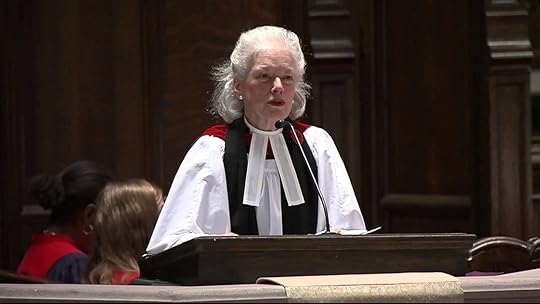 For Episode 53 we have another installment of Fridays with Fleming (Rutledge). I invited my friend and new member of the Cracker and Grape Juice Posse, Taylor Mertins, and Fleming’s #2 Fan, Kenneth Tanner, to be a part of our conversation.
For Episode 53 we have another installment of Fridays with Fleming (Rutledge). I invited my friend and new member of the Cracker and Grape Juice Posse, Taylor Mertins, and Fleming’s #2 Fan, Kenneth Tanner, to be a part of our conversation.
We recorded this several weeks ago, talking with Fleming Rutledge about a variety of subjects including preaching preparation, Black Lives Matter, difficult sermons, the Eastern Orthodox Church, and the crucifixion of Jesus Christ.
Be on the lookout for future episodes with next week with Becca Stevens, Brian McLaren, and Father James Martin.
The Cracker & Grape Juice team will be part of Home-brewed Christianity’s Theology Beer Camp this June in L.A.. There’s only 15 tix left so if you’d like to be a part of it, check it out here.
You can download the episode and subscribe to future ones in the iTunes store here
We’re breaking the 1K individual downloaders per episode mark.
Help us reach more people:
Give us 4 Stars and a good review there in the iTunes store.
It’s not hard and it makes all the difference.
It’ll make it more likely more strangers and pilgrims will happen upon our meager podcast. ‘Like’ our Facebook Page too. You can find it here.
Oh, wait, you can find everything and ‘like’ everything via our new website: www.crackersandgrapejuice.com
If you’re getting this by email, here’s the permanent link to the episode.
Follow @cmsvoteup

November 17, 2016
Cancer is Funny: My Interview at Patheological
 I’ve never pressed the flesh with Todd Littleton but he’s my biggest fan and claims to have a man-crush on me (he apparently has a photo of me in his study). Neither of those may be truth but there’s no doubt I’m grateful for the way God brings friends like Todd into my life, even friends through this un-incarnational means called the internet. As friends should do, I know better what I think and write because Todd tells me what I think and write.
I’ve never pressed the flesh with Todd Littleton but he’s my biggest fan and claims to have a man-crush on me (he apparently has a photo of me in his study). Neither of those may be truth but there’s no doubt I’m grateful for the way God brings friends like Todd into my life, even friends through this un-incarnational means called the internet. As friends should do, I know better what I think and write because Todd tells me what I think and write.
Todd came into my life at the same time cancer intruded into it so it seemed especially appropriate that as my book, Cancer is Funny: Keeping Faith in Stage-Serious Chemo, releases soon he would be the first person I talked with about it.
Coming up, I’ll be on the Lectiocast with JR Daniel Kirk to talk about the book and in January Tripp Fuller of Home-Brewed Christianity will interview me as part of HBC’s Theology Beer Camp.
On Friday, 12/2 here in DC two friends in my church have organized a Friar’s Club Roast of yours truly to kick-off the book. Clearly, I’m an easy target so it promises to be a great event. And, it’s off Methodist premises so there’ll be libations available too.
As part of the night, Dr. Tony Jones, author of Did God Kill Jesus? and the one who first encouraged me to start this blog, to launch our podcast, and to write the book, will be here from the Twin Cities to be a featured roaster.
Also on tap, Dr. Jeffrey Pugh, author of Religionless Christianity: Dietrich Bonhoeffer in Troubled Times and Professor of Religion at Elon University, will be another guest roast master. As will my friend and mentor Dr. Dennis Perry and a host of others. The Roast Master for the night will be my dear friend Brad Todd, a frequent guest on Meet the Press who runs OnMessage Inc and is one of the architects of Trumpocalypse. If you didn’t vote for the Donald this is your chance to roast Brad too!
So, if you’re on my blog list and live in the DC area come on out for a laugh with us. If you’re in my congregation, definitely come. I freaking dedicated the book to you all; it’s the least you can do!
Details:
Date – Friday, December 2, 2016 at 7:00 PM
Location – Mt. Vernon Country Club
Get your tickets by clicking here
Okay, here’s the interview with Todd. If you’re getting this by email, the link to the audio is here.
Follow @cmsvoteup

November 16, 2016
Episode 52: David Fitch – Fired Up about Faithful Presence
 For Episode 52, Teer and I talked with David Fitch about his brand new book, Faithful Presence: Seven Disciplines that Shape the Church for Mission.
For Episode 52, Teer and I talked with David Fitch about his brand new book, Faithful Presence: Seven Disciplines that Shape the Church for Mission.
“In our quest to renew the church, Christians have walked through seeker-friendly, emergent, missional, and other movements to develop new expressions of the body of Christ. Now in the post-Christian world in North America we’re asking the question again: Is there a way to be the church that engages the world, not by judgment nor accommodation but by becoming the good news in our culture? In Faithful Presence, noted pastor and scholar David Fitch offers a new vision for the witness of the church in the world. He argues that we have lost the intent and practice of the sacramental ways of the historic church, and he recovers seven disciplines that have been with us since the birth of the church. Through numerous examples and stories, he demonstrates how these revolutionary disciplines can help the church take shape in and among our neighborhoods, transform our way of life in the world, and advance the kingdom. This book will help you re-envision church, what you do in the name of church, and the way you lead a church. It recovers a future for the church that takes us beyond Christendom. Embrace the call to reimagine the church as the living embodiment of Christ, dwelling in and reflecting God’s faithful presence to a world that desperately needs more of it.”
It’s a dynamite book. I used an early version of it this summer when I taught the Course of Study Missiology class at Wesley Theological Seminary. It’s the kind of book that got into my skin enough that I could offhand a comment like this to Kenneth Tanner:
Be on the lookout for future episodes with Ben Witherington, Brian McLaren, Father James Martin, Becca Stevens, and Danielle Shroyer.
We’ve already got enough interviews lined up to take us into the new year.
You can download the episode and subscribe to future ones in the iTunes store here
We’re breaking the 1K individual downloaders per episode mark.
Help us reach more people:
Give us 4 Stars and a good review there in the iTunes store.
It’s not hard and it makes all the difference.
It’ll make it more likely more strangers and pilgrims will happen upon our meager podcast. ‘Like’ our Facebook Page too. You can find it here.
Oh, wait, you can find everything and ‘like’ everything via our new website: www.crackersandgrapejuice.com
If you’re getting this by email, here’s the permanent link to the episode.
Follow @cmsvoteup

November 15, 2016
Fear of the Other: Sermon by Will Willimon
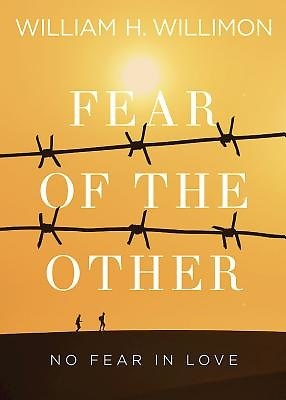 Bishop Will Willimon, author of Fear of the Other, was our guest preacher the Sunday after Trumpocalypse. His text was Romans 5. Not only is the book dedicated to Donald Trump (…without whose xenophobia ‘I wouldn’t have been asked to write this book.’) it’s an incredibly timely book for those who are repulsed by Trump and how we’re to love the ungodly which surely includes even Donald Trump.
Bishop Will Willimon, author of Fear of the Other, was our guest preacher the Sunday after Trumpocalypse. His text was Romans 5. Not only is the book dedicated to Donald Trump (…without whose xenophobia ‘I wouldn’t have been asked to write this book.’) it’s an incredibly timely book for those who are repulsed by Trump and how we’re to love the ungodly which surely includes even Donald Trump.
“We’ve got to love the ungodly…even an ungodly liar like Donald Trump.”
Listen to it.
Follow @cmsvoteup

November 14, 2016
The Politics of Jesus
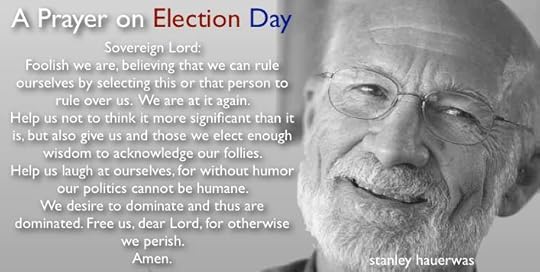 Here’s my sermon from our Saturday evening worship service. At the last minute, given the cultural climate post-election, I chose Mark 12.13-17 as my text.
Here’s my sermon from our Saturday evening worship service. At the last minute, given the cultural climate post-election, I chose Mark 12.13-17 as my text.
For the last 18 months, according to the Principalities and Powers, this Tuesday’s election was supposed to be the most important event in our lifetimes if not in history, an odd and hyperbolic claim for Christians to accept given that the only democratic election portrayed in the Gospels is when we choose Barrabbas over Jesus.
Christians are right to be passionate about the candidates and causes for whom they advocated; likewise, Christians are right to feel somewhere between fearful to righteously appalled over the rhetoric with which Tuesday’s results were purchased.
Still, as divided as we are as a country, as euphoric as some are over Tuesday’s results and as distraught as others are over Tuesday’s results-
it’s hard to imagine Christians in the first century were so preoccupied as us with whether it would be Nero or Britannicus who would succeed the Emperor Claudius.
That’s because Christians in the first century already were shorn of the mythologies into which we as American Christians have been enculturated. Many of us have been conditioned by the liturgies of Civil Religion to believe that America is the Kingdom and to believe, as a matter of consequence, that the Republican and Democratic parties are mutually exclusive means to serve that Kingdom.
The first Christians knew, as a fundamental of their, what we do not. They knew as basic correlative of their confession that Rome was not the Kingdom.
And knowing that Rome was not the Kingdom, the first Christians knew better than we that the politics made available to them by Rome were not God’s politics.
But rather in world captive to the politics called empire, God had taken flesh and sent his Spirit in order to make a different politics possible- the politics we call Church.
The Church doesn’t have a politics; as Stanley Hauerwas says, the Church is a politics.
————————
The way Jesus negotiates the question put to him in Mark 12 clarifies that statement: The Church doesn’t have a politics; the Church is a politics.
Before I continue, I should point out that Jesus gets crucified right after today’s passage. If I can just do better than Jesus, I’ll be happy.
Given our hyper-partisan culture, if we can all just take a deep breath, if you can just trust me for the next few minutes, and if we can make it, in Jesus’ name, to the end of the sermon together- if we can just do that then Aldersgate Church will be like a light to the nation, like a city shining on a hill.
To insure I don’t end up, like Jesus, on a cross at the end of this scripture, I want to be as simple and straightforward as I can today. No jokes, no inspiring stories and absolutely no personal opinions- you have my word on that.
I just want to open up today’s scripture passage, unpack it for you and then offer you one clear, bipartisan recommendation that I believe comes out of this scripture.
“Teacher, is it lawful to pay taxes to Caesar or not? Should we or shouldn’t we? Yes or no?”
The first thing this passage makes unavoidable is that Jesus is political. It’s not that he’s not.
I know some of you have a Joel Osteen notion of Christianity: that Christianity is a private religion of the heart, and Jesus is about spiritual things. The only problem with that kind of Christianity is that it requires a bible other than the one God has given us.
Mary’s pregnancy begins with her singing of how her in-utero Messiah will one day topple rulers from their thrones and send the rich away with nothing.
Jesus kicks off his ministry by declaring the Year of Jubilee: the forgiveness of all monetary debt.
And for 3 years, Jesus teaches about the Kingdom of God and, because Jesus was a Jew, he didn’t have pearly gates in mind. He was talking about the here and now.
Jesus is political.
The Gospel story begins by telling you about a tax levied by Caesar Augustus to make the Jews pay for their own subjugation. The Gospel story ends with Pilate killing Jesus- on what charges? On charges of claiming to be a rival king and telling his followers not to pay the tax to Caesar.
The tax in question was the Roman head tax, levied for the privilege of being a Roman citizen. The head tax could only be paid with the silver denarius from the imperial mint.
The denarius was the equivalent of a quarter.
So it’s not that the tax was onerous.
It was offensive.
One side of the coin bore the image of the emperor, Caesar Tiberius, and on the other side was the inscription: ‘Caesar Tiberius, Son of God, our Great, High Priest.’ Carrying the coin broke the first and most important commandment: ‘You shall have no other gods before me.’
And because it broke the commandments, the coin rendered anyone who carried it ritually unclean.
It couldn’t be carried into the Temple, which is why money changers set up shop on the Temple grounds to profit off the Jews who needed to exchange currency before they worshipped.
You see how it works?
“Teacher, is it lawful to pay taxes to Caesar or not?”
What they’re really asking, here, is about a whole lot more than taxes. But to see that, to see what they’re really asking, you’ve got to dig deeper in to the passage. Today’s passage takes place on the Tuesday before the Friday Jesus dies.
On the Sunday before this passage, Jesus rides into Jerusalem to a king’s welcome.
On Monday, the day before this passage, Jesus ‘cleanses’ the Temple. Jesus has a temper tantrum, crashing over all the cash registers of the money changers and animal sellers and driving them from the Temple grounds with a whip. And that’s when they decide to kill Jesus.
Why?
To answer that question, you need to know a little history.
200 years before today’s passage, Israel suffered under a different empire, a Greek one. And during that time, there was a guerrilla leader named Judas Maccabeus. He was known as the Sledgehammer. The Sledgehammer’s father had commissioned him to “avenge the wrong done by our enemies and to (pay attention) pay back to the Gentiles what they deserve.”
So Judas the Sledgehammer rode into Jerusalem with an army of followers to a king’s welcome. He promised to bring a new kingdom. He symbolically cleansed the Temple of Gentiles, and he told his followers not to pay taxes to their oppressors.
Judas Maccabeus, the Sledgehammer, got rid of the Greek Kingdom only to turn around and sign a treaty with Rome. He traded one kingdom for another just like it.
But not before Judas the Sledgehammer becomes the prototype for the kind of Messiah Israel expected.
That was 200 years before today’s passage.
About 25 years before today’s passage, when Jesus was just a kindergartner, another Judas, this one named after that first Sledgehammer, Judas the Galilean- he called on Jews to refuse paying the Roman head tax. With an armed band he rode into Jerusalem to shouts of ‘hosanna,’ he cleansed the Temple. And then he declared that he was going to bring a new kingdom with God as their King. Judas the Galilean was executed by Rome.
You see what’s going on?
Jesus the Galilean has been teaching about the Kingdom for 3 years. He’s ridden into Jerusalem to a Messiah’s welcome. He’s just cleansed the Temple and driven out the money changers. The only thing left for Jesus the Sledgehammer to do is declare a revolution. That’s why the Pharisees and Herodians trap Jesus with a question about this tax:
Jesus, do you want a revolution or not? is the real question.
Come down off the fence Jesus.
Which side are you on?
Politics makes for strange bedfellows.
For the Pharisees and the Herodians to cooperate on anything is like the Republicans nominating a lifelong Democrat to be their nominee. And that’s not even an exaggeration because the Pharisees and the Herodians were the two political parties of Jesus’ day.
The Sadducees were theological opponents of Jesus. But the Pharisees and the Herodians were first century political parties. The Pharisees and the Herodians were the Left and the Right political options.
And instead of Donkeys and Pachyderms, you can think Swords and Sledgehammers.
The Herodians were the party that supported the current administration. They thought government was good. Rome, after all, had brought roads, clean water, sanitation, and- even if it took a sword- Rome had brought stability to Israel. The last thing the Herodians wanted was a revolution, and if Jesus says that’s what he’s bringing, they’ll march straight off to Pilate and turn him in.
The Pharisees were the party that despised the current administration. The Pharisees were bible-believing observers of God’s commandments. They believed a coin with Caesar’s image and ‘Son of God’ printed on it was just one example of how the administration forced people of faith to compromise their convictions.
The Pharisees wanted regime change. They wanted another Sledgehammer. They wanted a revolution. They just didn’t want it being brought by a 3rd Party like Jesus, who’d made a habit of pushing their polls numbers down.
And so, if Jesus says he’s not bringing a revolution, the Pharisees will get what they want: because all of Jesus’ followers will think Jesus wasn’t really serious about this Kingdom of God stuff, and they’ll write him off and walk away.
That’s the trap.
“Teacher, is it lawful to pay taxes to Caesar or not? Is it or isn’t it?’
If Jesus says no, it will mean his death.
If Jesus says yes, it will mean the death of his movement.
Taxes to Caesar or not, Jesus?
Which is it going to be? The Sword or the Sledgehammer?
Which party do you belong to?
You’ve got to choose one or the other.
What are your politics Jesus?
Jesus asks for the coin.
And then he asks the two political parties: ‘Whose image is on this?’ And the Greek word Jesus uses for image is ‘eikon,’ the same word from the very beginning of the bible when it says that you and I were created to be ‘eikons of God.’ Eikons of Caesar. Eikons of God.
Jesus looks at the coin and he says ‘Give to Caesar what is Caesar’s but give to God what is God’s.’
But even then it’s not that simple or clear because the word Jesus uses for ‘give’ isn’t the same word the two parties used when they asked their question. When the Pharisees and Herodians asked their question, they’d used a word that means ‘give,’ as in ‘to present a gift.’ But when Jesus replies to their question, he changes the word.
Instead Jesus the very same word Judas the Sledgehammer had used 200 years earlier. Jesus says: ‘Pay back to Caesar what he deserves and pay back to God what God deserves.’
You see how ambivalent Jesus’ answer is?
What does a tyrant deserve? His money? Sure, it’s got his picture on it. He paid for it. Give it back to him.
But what else does Caesar deserve? Resistance? You bet.
And what does God deserve from you?
Everything.
Everything.
Jesus is saying is: ‘You can give to Caesar what bears his image, but you can’t let Caesar stamp his image on you because you bear God’s image.’
Jesus is saying you can give to Caesar what belongs to Caesar.
But you can’t give to Caesar, you can’t give to the Nation, you can’t give to your Politics, you can’t give to your Ideology, you can’t give to your Party Affiliation-
you can’t give to those things, what they ask of you:
ultimate allegiance.
You see, like a good press secretary, Jesus refuses the premise of their question. The Pharisees and the Herodians assume a 2-Party System. They assume it’s a choice between the kingdom they have now. Or another kingdom not too different. They assume the only choice is between the Sledgehammer or the Sword.
But like a good politician, Jesus refuses their either/or premise. He won’t be put in one their boxes. He won’t choose sides. Because Jesus the Galilean was leading a different kind of revolution than Judas the Galilean.
A revolution not with a sword or a sledgehammer.
But with a cross.
Jesus refuses to accept their premise.
Because his movement wasn’t about defeating his opponents. His movement was about dying for his opponents.
And that’s a politics that qualifies and complicates every other politics.
—————-
If you’re like me, social media has been a good and uplifting use of your time this week.
The Bible has a word for the red and blue rhetoric we’ve posted and tweeted and liked and shared this week.
Idolatry.
And for some of you, left and right, this is a serious spiritual problem.
So here’s my one, simple bipartisan post-election prescription. It’s one I think we can all agree upon and I think it’s one that might actually do some public good:
Don’t do to Jesus what Jesus wouldn’t do to himself.
Don’t do to Jesus what Jesus wouldn’t do to himself.
Don’t put Jesus in a box. Don’t make Jesus choose sides. Don’t put a sword or a sledgehammer, an elephant or a donkey, in Jesus’ hands.
Don’t say Jesus is for this Party. Don’t say this is the Christian position on this issue. Don’t say faithful Jesus followers must back this agenda or demonize those who disagree.
Because we all know it’s more complicated than that. Because we’re more complicated than 140 characters and 30 second soundbites. And so is the Gospel.
Don’t do to Jesus what Jesus wouldn’t do to himself.
I mean, this might be an epiphany newsflash for some of you, but you can find good, faithful, sincere, bible-believing, Jesus-following Christians everywhere all along the political spectrum.
You know how I know that? You’re sitting in front of me.
But what you must not do is insist that Jesus is for this or that politics.
Jesus wouldn’t do that to himself so why are you doing it to him?
You’re mixing up God and Caesar.
You’re making Jesus fit your politics instead of conforming your politics to Jesus.
You’re committing idolatry, using your ultimate allegiance to bless and baptize your earthly opinions.
Don’t do to Jesus what Jesus wouldn’t do to himself.
Because when you do-
When you do to Jesus what he wouldn’t do to himself, it becomes too easy to believe that the problems in the world are because of the people on the Left or the Right instead of what the Gospel says: that the problem in the world is what’s in here (the heart) in all of us.
When you do to Jesus what he wouldn’t do to himself, it becomes harder and harder to like your neighbor and it becomes impossible to love your enemy.
When you do to Jesus what he wouldn’t do to himself, you forget that the Kingdom Jesus’ death and resurrection kicked off isn’t a Kingdom that any political party can ever create.
When you do to Jesus what he wouldn’t do to himself, you forget that the Kingdom launched by Jesus’ death and resurrection is a Kingdom:
where trespasses are forgiven, gratis;
where grace is offered, free of charge;
where enemies are prayed for on a weekly basis;
where peace isn’t a soundbite but a practice;
where money is shared without debate so that the poor would be filled; where our earthly differences are swallowed up because its more important for us to swallow the body and blood of Christ at this Table together.
When you do to Jesus what he wouldn’t do to himself, you forget that the Kingdom Jesus brings is you.
Us. The Church.
We’re Jesus’ politics.
In the name of the Father, Son, and Holy Spirit. Amen.
—————–
In case you missed it, here’s our Post Election Live Edition of Friday’s with Fleming (Rutledge):
Follow @cmsvoteup

November 12, 2016
Grace and Justice
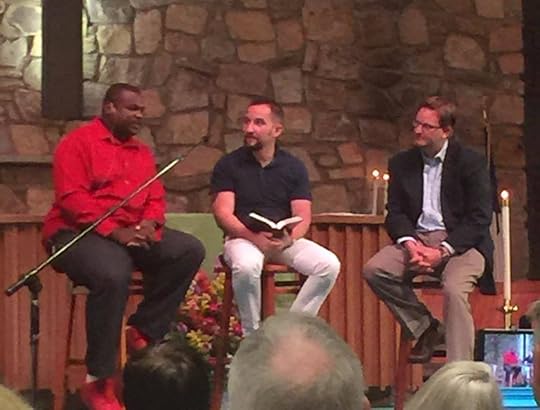 My friend Brian Stolarz spoke at my house last night for a book-signing party about his new book Grace and Justice: The Race Against Time and Texas to Free an Innocent Man.
My friend Brian Stolarz spoke at my house last night for a book-signing party about his new book Grace and Justice: The Race Against Time and Texas to Free an Innocent Man.
Elections have consequences. A consequence of this most recent one is that it’s now much less likely the death penalty will be abolished and now more likely that people like Dewayne, without people like Brian, will die unjustly.
Here’s the video. Check out his book here.
Follow @cmsvoteup

Jason Micheli's Blog
- Jason Micheli's profile
- 13 followers



